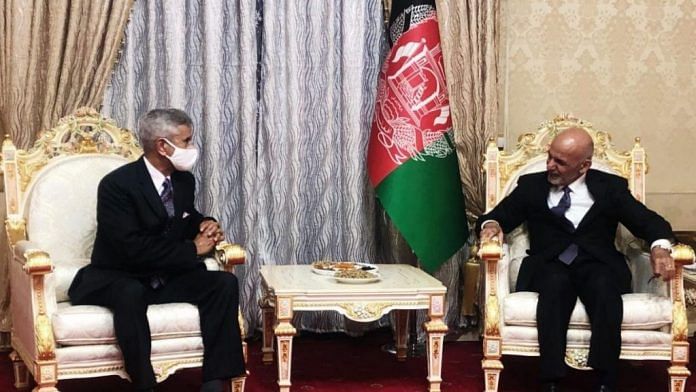
Thank you dear subscribers, we are overwhelmed with your response.
Your Turn is a unique section from ThePrint featuring points of view from its subscribers. If you are a subscriber, have a point of view, please send it to us. If not, do subscribe here: https://theprint.in/subscribe/
As the US troops exit Afghan land, the continuous attempt by the Taliban to capture majority of provinces and eventually Kabul is underway, risking the geo-political relations and strategic understanding of Afghanistan with its ally nations. The war-torn country seems to be in a huddle of proceeding towards a complete breakdown, which might lead to civil war. Meanwhile, the Taliban and the Afghan government are trying to lobby for a peace deal and announce a truce in backchannel talks in Qatar, but the terror outfit has put a clear condition to first oust President Ashraf Ghani and thereafter form a new government via negotiation.
According to US General Mark Milley, the Taliban now controls about half of Afghanistan’s 419 district centres. The US, in its misadventures in Afghan in the last two decades, achieved minimal output due to its over-dependency on Pakistan to carry forward the motive. Except for the killing of Osama Bin Laden, the US couldn’t derive regional peace, building a credible state structure, women’s rights, general education, creation of private enterprises among other primary objectives to curtail the conflict and has been stretching the war since a long period.
One of the most affected nations due to the Afghan-Taliban conflict would be India as its stakes are high in Afghanistan. The Indian subcontinent has always rubbed shoulders with the Afghan establishment and worked for development and prosperity of the latter. While the tuning between the two countries has been strategic and filled with camaraderie, now the Taliban’s shadow looms large over India’s economic investment in Afghanistan, which tunes to over 400 projects that India undertook in 34 provinces.
India has built vital dams, roads, schools, hospitals, electricity transmission lines and substations among others which remains a greatest infrastructural push for Afghanistan on the path of development. India’s assistance in rebuilding Afghan is estimated to be worth over $3 billion and India has also built the Afghan Parliament at $90 million which was inaugurated by Prime Minister Narendra Modi in 2015.
But in future economic reconstruction of Afghanistan, China will be a dominant factor as its dream project of Belt and Road Initiative via China-Pakistan Economic Corridor has considerable presence in Afghanistan and passes through Chabahar port. But Beijing will be wary of Taliban’s extremist nature as in a recent blast in Pakistan, nine Chinese nationals were also killed; alongside, Xi Jinping government’s misadventures in Xinjiang province with Uighur Muslims might boomerang in Afghan-Taliban deal.
So, the upcoming Shanghai Cooperation Organisation (SCO) meet could be a game-changer for Afghanistan’s future, considering it’ll be a forum to see geo-political play among some of the most important neighbours of Afghanistan like Pakistan, India, Russia, China, Uzbekistan, etc. Russia has its own concerns with Afghanistan, the latter becoming another Islamic State.
But can the Taliban spring a surprise and take a stand to be nationally oppressive but lowering international terrorism? Can we expect a moderate Taliban in the long run? The answer lies more in the matter of hope, where one can expect the Taliban moving the country to be more accommodative of minorities and far less interested in promoting religious extremism and violence in other countries.
Afghanistan has an incentive of being reasonable but being wary of ideologues is acceptable as they have a logic of their own. If the Taliban 2.0 version can be different from Taliban 1.0, then a whole new possibility and geo-political alliances will spring up. As India doesn’t have direct access to Afghanistan, the indirect aid of Iran in the last two decades has helped India rebuild the new Afghanistan. And it seems India will be looking for greater regional diplomacy with Iran and Russia in context of Afghan-Taliban’s future course of action, which can be illustrated during the upcoming SCO meet, since India has moderate foreign relations with these two countries. Because India can’t act in isolation, leaving a vacuum in Afghanistan now could be dangerous.
These pieces are being published as they have been received – they have not been edited/fact-checked by ThePrint.

COMMENTS